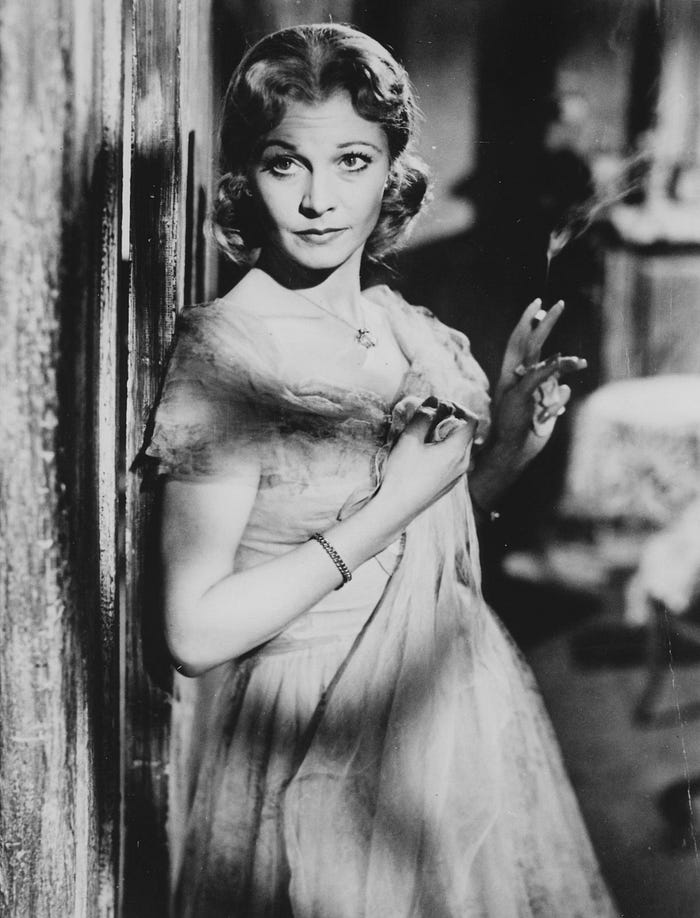Blanche’s Monologue — A Streetcar Named Desire — Tennessee Williams — IB English Literature (2015)

In Tennessee Williams’ A Streetcar Named Desire, monologues play a vital part in highlighting the most significant qualities of the characters who deliver them, Blanche in particular. Right from the start of the play, the audience is introduced to a profoundly hysterical, insensitive and self-obsessed character and the monologue in question epitomises these qualities.
Blanche’s tendency to be hysterical can be observed in the following line: “All of those deaths! The long parade to the graveyard!”. Here, Blanche hyperbolises the deaths she witnessed, comparing the funerals she attended to a ‘long parade’, which illustrates her insensitivity towards the deaths given her sarcastic tone. The connotations that are normally associated with funerals are far less ecstatic than that of a parade. “Sometimes their breathing is hoarse, and sometimes it rattles, and sometimes they even cry out to you, ‘Don’t let me go!’”. Blanche’s use of anaphora (the repetition of a word or phrase at the beginning of successive clauses) further illustrates her inclination to self-dramatise. “The Grim Reaper had put his tent on our doorstep….Stella. Belle Reve was his headquarters!”, her reference to the personification of death both highlight her frivolousness and snobbish attitude and as the monologue progresses, this inclination intensifies and becomes more of a direct attack at Stella.
Blanche’s monologue transforms from being puerile self-victimisation into an unprovoked attack on Stella. “And you sit there telling me with your eyes that I let the place go…How in hell do you think all that sickness and dying was paid for?”. Blanche becomes more aggressive in her speech and her colloquial diction illustrated in her use of the phase “How in hell” suggests that she condemns Stella for not having been present when all of the deaths took place. “Where were you. In bed with your — Polak!”. Blanche’s accusations not only convey her condemnation towards Stella’s absence during the deaths, but also underscores her profound disgust for Stella’s new-found love, Stanley. She reduces him to nothing more than ethnic slur ‘Polak’, which she struggles to utter signified by the brief pause she takes before finally labelling him so contemptibly. Furthermore, the fact that Blanche regards the relationship between Stella and Stanley with contempt also suggests her own insecurity in that Stella is her younger sister and has found a partner with whom she is deeply in love. By reminding Stella of Blanche’s noble past Blanche seeks to undermine Stella’s present.
Blanche’s self-obsession becomes more palpable as she attempts to cast aspersions on Stella’s integrity. Blanche exclaims that “Death is expensive”, echoing the responsibility she had in catering for the members of her family who passed away — a responsibility she seems to despise, which reinforces her self-absorption. In addition, Blanche assigns to her younger sister the unmarried title of “Miss”, which mimics the same fashion in which Stella would have been addressed by her servants when she had still been residing Belle Reve. This is perhaps another one of Blanche’s attempts to chide Stella by reminding her of where she came from as well as a lamentation of the life that she has chosen to have with Stanley.
Blanche’s entire monologue is decorated with lyrical and poetic diction and she becomes increasingly accusatory and condemning towards Stella. All of this points towards Blanche’s self-obsessive and insensitive attitude to the extent that she is not mindful of how hurtful her words are to Stella.
